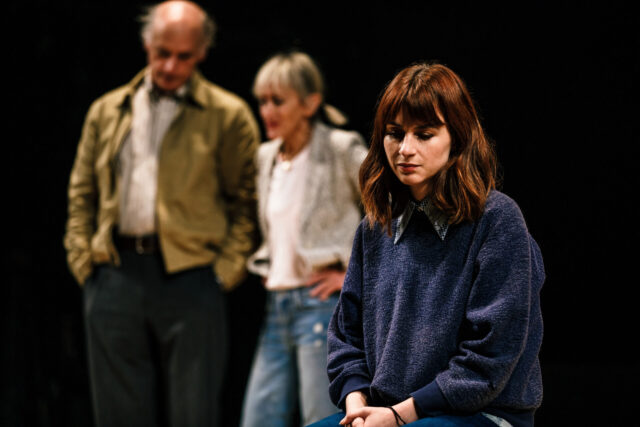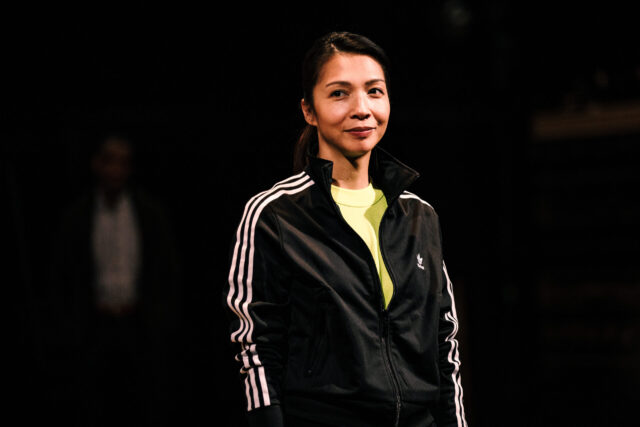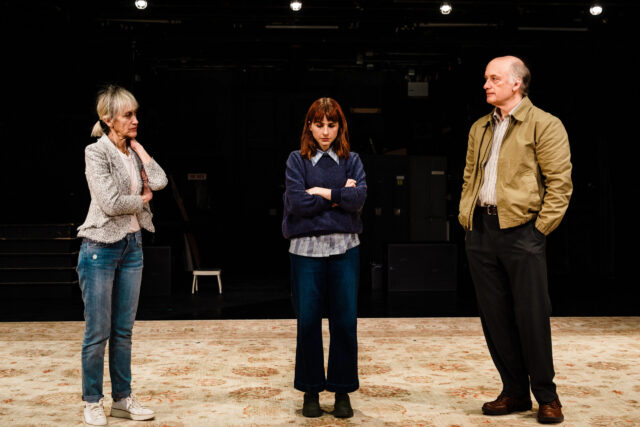
Ella (Aya Cash) considers her future as her parents (Frank Wood and Constance Shulman) worry about theirs in MTC world premiere (photo by Marc J. Franklin)
THE BEST WE COULD (a family tragedy)
Manhattan Theatre Club
New York City Center Stage 1
Tuesday – Sunday through March 26, $79-$99
212-581-1212
www.manhattantheatreclub.com
www.nycitycenter.org
Our Town meets Death of a Salesman in Emily Feldman’s potent and moving The Best We Could (a family tragedy), a Manhattan Theatre Club production running at New York City Center Stage 1 through March 26.
The ninety-minute show is narrated by Maps (Maureen Sebastian), who also occasionally plays different minor roles. “We’re about to get started here,” she says directly to the audience at the beginning. “Could we take some of these lights down a little bit, please?” she asks lighting designer Matt Frey, and he obliges. She sets the pace with an unhurried, relaxed monologue, then introduces the characters: Ella (Aya Cash), a thirty-six-year-old woman still trying to find herself, currently working as a chair yoga instructor at a rehab facility in Los Angeles; her father, Lou (Frank Wood), formerly a senior investigator at a biomedical research institute; her mother, Peg (Constance Shulman), a retired event planner who lives with Lou in New Jersey; and Marc (Brian D. Coats), Lou’s longtime friend and colleague who lives in Denver with his wife.
“Marc . . . You’re not really in the first part,” Maps says. “Sorry to make you wait.” Marc walks to a far corner of the stage, which is a large, empty central rug where all the action takes place. When a character is not in a scene, they watch from the sides or from the back, which resembles a garage.

Maureen Sebastian serves as the narrator and plays numerous small parts in The Best We Could (a family tragedy) (photo by Marc J. Franklin)
It’s Ella’s birthday, but she’s been stood up by her girlfriend. Maps directs her: “Wait thirty minutes. Wait an hour. Leave alone. . . . Tell Crystal it’s over. Your mother is calling. Answer the phone.”
After their dog dies, Peg sends Lou to California by plane to pick up a new rescue dog and drive back cross-country with Ella, who ostensibly has a meeting with a children’s book editor in New York City. On the way, Lou and Ella see various national monuments and stop to visit with Marc and his wife, Karen (Sebastian), in Colorado, where Lou discusses his pending job application in Marc’s department.
But the closer they get to home, the more uncomfortable both Ella and Lou seem with, as we eventually find out, good reason.
Feldman (Three Women in Four Chairs, My Lover Joan) and director Daniel Aukin (Fool for Love, Bad Jews) do a superb job conjuring a drive across America without any props other than chairs; when they stop at Mount Rushmore and the Grand Canyon, you feel you are there even though it is two characters sitting or standing on an empty stage. The spare set is by Lael Jellinek, with lighting by Matt Frey and sound by Kate Marvin. The cleverly outlined and believable story about an older man trying to hold his place in a world that that threatens to leave him behind, reminiscent of Willy Loman, gives way to one crucial late plot twist that jolts the narrative ahead toward its tragic conclusion but seems to have come out of nowhere except recent headlines, strangely ungrounded in the characters we’ve been watching for seventy minutes or so.

Peg (Constance Shulman), Ella (Aya Cash), and Lou (Frank Wood) face hard truths in Emily Feldman play (photo by Marc J. Franklin)
Tony winner Wood (Sideman, In the Blood) is wonderfully deadpan throughout, portraying a man who’s living in his own alternate reality. The always terrific Shulman (SHHH, Orange Is the New Black) is very funny as the ever-worried Peg, while Cash (From Up Here, The Pain and the Itch) keeps the deeply troubled Ella appropriately on edge, not necessarily the heroic figure we want her to be; her description of what her book is about is telling: “the inner emptiness of being a person living in a warlike society that, on some level, believes it has no future.” Coats (On the Levee, La Ruta) provides solid support as Lou’s old buddy, who knows more than he admits.
Sebastian (Vietgone, Now Circa Then) is a lovely stage manager, giving direction to the characters, delivering interstitial notes to the audience, and inhabiting several roles, generally in a track suit. (The costumes are by Anita Yavich.) She’s not about to take any nonsense from any of them, nor is she going to let the show drift too far off course. Once Ella and Lou return to Peg, Maps tells Ella, “Get everything out in the open.” Ella hesitates, so Maps adds. “Go ahead.” Ella does, and it’s not pretty. “I’m sorry. But, this is the tragedy part,” Maps tells us.
Despite its major plot misstep, The Best We Could is an involving tale that follows a relatively average, if offbeat, family trying to do the best they can. Sometimes it works out, and sometimes it doesn’t. It’s the American way.